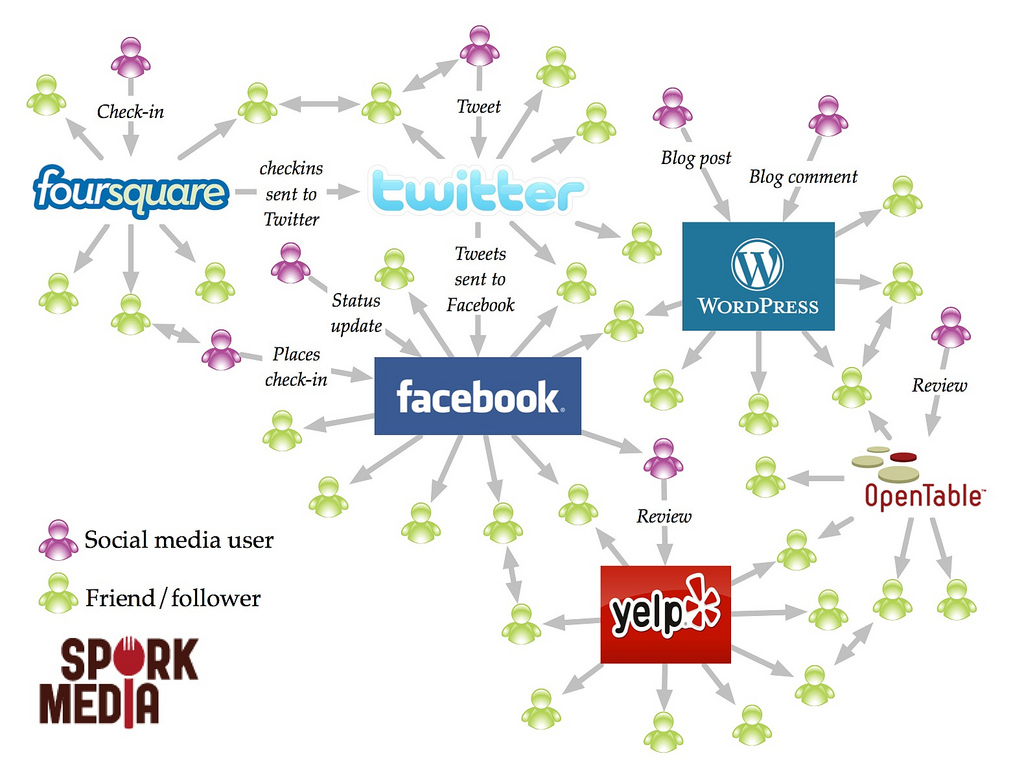Which Social Media Networks are Right for Your Law Firm?
Featured image courtesy of kat m research licensed under creative commons.
Which Social Networks Should My Law Firm Join?
Social Networking seems to be growing exponentially. Nearly every week, we get an invitation for a new network. At first it was just LinkedIn, Facebook, and Twitter. Google+, Pinterest, and many others have since sprouted up. How do you know if your firm needs a YouTube page? Should you be on Flickr? In this post we will do our best to help you decide which networks are right for your law firm.
First, we need to establish that your firm should be using social media at all. Is there really a reason to invest so much time and effort into something that does not provide clear results? Yes. Here are three of the most important reasons why:
- If someone is using social media to find a lawyer, your firm has to be there or else it won’t be found.
- If all of your competitors and colleagues are using social media, but you aren’t, your firm may appear less cutting edge and up to date.
- Social media, when used correctly, is a conversation. It is a way to make connections and learn.
Once you have decided to establish social media accounts for your firm, you must decide which networks make the most sense for you. First, I will deal with the no-brainers.
Networks Your Firm Must Join
When you first log on to Twitter, it appears to be a jumbled chaotic mess full of spammers and self-proclaimed experts. However, after a little exploring, it becomes apparent that Twitter is the largest conversation that has ever existed. Part of that conversation is about the practice of law, and, as it has often been said, that conversation will happen whether you participate or not. The decision to not only use Twitter, but to participate in that conversation, drives learning, networking, and the practice of law. Twitter is also the place many people go to complain (or rave) about businesses and services. Monitoring Twitter regularly allows you to see what people are saying about you. We have previously published a post that can help you figure out who to follow on Twitter if you are just getting started. (Follow DotCO Law Marketing on Twitter)
LinkedIn is a place for professionals to meet. It is a bit like Facebook, but more business oriented. Every lawyer should be on LinkedIn individually and every firm should also have a page. LinkedIn helps lawyers cultivate and maintain professional relationships made offline while allowing for introductions and networking online. Built-in groups features help you plan events and have discussions. Job search features can help you find new employees. (Find us on LinkedIn)
By now, you probably know what Facebook is and how it works. The important question is whether your firm belongs there. It does. Believe it or not, there are people who will look for a lawyer on Facebook. Just being there might get you a client at some point. Law firms should not expect to get the same reaction from their pages that major corporations get. There is no reason why your law firm should ever have thousands or “likes” or fans. Facebook does allow you to easily share links, contact information, and other relevant news without keeping a window open all day. Your firm’s Facebook page will not need constant monitoring, as almost no one will visit it. If you are investing time on social media, it is worth a few hours to create a Facebook page, but do not let it drain your time or resources after that. (Visit DotCO Law Marketing on Facebook)
Networks to Join for a Specific Purpose
Google+
Google+ seems to have stalled a bit since its inception. No one is quite sure what to use it for right now. Its main advantage over Facebook in its infancy was better privacy controls. However, Facebook has since adopted similar mechanisms. The biggest reason to be on Google+ is that it gives your firm the appearance of being tech-savvy. People do not accidentally find themselves on Google+, and anyone finding your firm’s page there will realize this. A firm with a Google+ page gives the appearance of staying current in technology, which may also help you convince potential clients that you are on the forefront of legal practice. Google+ does not seem the be the place where the future of legal discourse will evolve, but is probably the best social network for people interested in the advancement of technology.
YouTube
If your firm has a good reason to be on YouTube, you probably already have an account. Posting videos about commonly asked legal questions is a great way to get attention while helping potential clients. Your firm might also make videos introducing all of its employees, partners, and associates, or give a tour of your office. YouTube’s utility is somewhat limited, but a great video can be seen by thousands of people.
Networks Your Firm Can Safely Ignore
Flickr
There is almost no reason why your firm would need a Flickr account. While we have previously discussed the importance of keeping a good camera around, it doesn’t make too much sense for a law firm to keep many pictures online. A gallery on your website or Facebook showing off your employees and office is fine, but you should not expect to accomplish any useful legal networking on a site like Flickr.
Spotify
While Spotify has been rapidly growing as a network for music fans, it offers no real benefit to law firms. That being said, it doesn’t hurt to grab a personal account and see what your friends are listening to.
Myspace
To paraphrase Disney’s Lion King:
Mufasa: Everything the light touches will be yours
Simba: What about that shadowy place?
Mufasa: That is Myspace. Lawyers must never go there, Simba.
Too Early to Know
It seems that every day, we come across multiple articles on Pinterest. Some of them are even about how lawyers can use this service. It doesn’t hurt to make a page for your firm, just to hold the name. It could turn out that Pinterest gets huge, and that lawyers flock to it, but we wouldn’t suggest spending too much time on it right now.
Does Your Law Firm Use Other Social Networks?
Have we missed any important social networks that your firm uses? Please comment and tell us what other networks make sense for your firm.
Read MoreLegal Marketing Strategies – Switch From Absolut to GEICO
Legal Marketing Strategies – Going from Absolut to GEICO by Diversifying
Featured image courtesy of teamstickergiant licensed under creative commons.
This blog has previously covered many different types of advertising strategies for law firms. We have recommended everything from billboards and newsletters to websites, radio ads, phone books and legal directories. A core principle at DotCO Law Marketing is the belief that using multiple types of advertising simultaneously is the most crucial part of your marketing campaign. This is why we recommend that the advertising space that we sell is used to supplement other advertising strategies such as firm websites and legal directory listings.
The GEICO Model vs. The Absolut Model
For a long time, Absolut Vodka had an excellent advertising campaign. Their iconic ads by TBWA were simple, clever, and pervasive. They became part of pop culture and stayed there for years. For many people, the Absolut bottle was the first image that popped into their head when they thought of vodka. While those advertisements were top notch, they were mostly limited to print, especially magazines. As the internet became more widely used, and social media grew in popularity, Absolut did not adapt. While the brand still enjoys strong sales, today’s market would rather drink Grey Goose because it comes in a better looking bottle.
As Absolut’s marketing campaign was fizzling out, GEICO came out of nowhere, seemingly made of pure magic. Rather than having one solid line of commercials, they had many, often at the same time. GEICO commercials saturated print, billboards, television, radio, the internet, and, briefly, were the basis of a television series. On any one day, a consumer might hear a standard sounding radio commercial about 15 minutes saving them 15% on car insurance, walk past a billboard featuring a pile of money with eyes staring back, see a print ad involving a gecko, watch a television spot involving a caveman, and download a GEICO ringtone. GEICO has done an incredible job of making multiple campaigns and characters more recognizable than even a single campaign from some other insurance companies. Their advertising has paid off, and GEICO is now one of the largest insurers in the United States.
Applying This Lesson to Your Law Firm
Very few law firms are ever going to have multiple television campaigns running at once, and even fewer will ever have apps or ringtones, but there is still plenty to be learned from what GEICO has done. No one type of advertisement will be seen by every potential customer. Furthermore, different types of advertising work on different people. When your law firm is planning advertising strategies, as many methods of advertising as possible should be used. Whether you decide to use one binding theme in all of your ads or to mix things up with a combination of serious and humorous ads, the key is to put them in more than one place. Billboards are great. So are television and radio. Advertising on the internet is essential. However, in this age, it must be remembered that the internet is not just one thing. A great website is essential, but it must be supplemented. Whether you pay a search engine for advertising space, list your firm with a directory, advertise with DotCO, or all three, saturation is key. When someone searches for a lawyer online, they can only choose your firm if they see it. The more searches that return your firm’s name, the more potential clients you will have. If your name is everywhere, it will be seen eventually.
Read MoreManaging Your Law Firm’s Online Reputation
Online Reputation Management for Your Law Firm
Frequently, a potential client’s first introduction to your firm is online. The client may see your firm’s website, a legal directory listing, or even a blog post written by an associate. These are generally good things. Unfortunately, if you have disgruntled former clients, potential new clients are likely to come across negative reviews on Yelp, disparaging Facebook posts, or a poor review on Google Places. It is essential that you prevent bad reviews from happening in the first place, and quickly take steps to counteract them if they pop up anyway.
The Key to a Good Online Reputation Starts Offline
The best way to get new clients is word of mouth. Personal referrals lead to law firm growth in a way that usually cannot be matched through advertising. At the same time, a law firm’s reputation is most vulnerable to attacks by its own clients. The best thing you can do to manage your firm’s online reputation is the same thing you already do to manage your professional reputation: Be professional! Treating clients with respect, giving them frequent updates about their case, and staying in touch and open to their concerns can only help you both in your practice and from a business standpoint. Of course, even the best attorney will find themselves at the receiving end of undue anger from a client who should really be upset with their own actions or the law.
The Most Important Places to Monitor Your Reputation
- If your firm has a Facebook page, monitor it. Make sure that any negative comments or posts are dealt with quickly. Simply deleting them can work, but it can also cause a major uproar. Addressing the concerns voiced in a malicious or unflattering post is the best way to fix the problem. Communicate as openly as possible to show other potential clients that you are responsive and have nothing to hide.
- Many unhappy customers take their complaints to Twitter. Searching Twitter daily for your name and your law firm’s name can help you ward off negative attention before it picks up steam.
- Perhaps the worst two places to fight negative reviews are Google Places and Yelp. Both of these services allow for detailed reviews of your firm. Google Places search results appear on nearly every relevant search, while Yelp results are often ranked very high in searches. One or two poor reviews on these services can do incredible amounts of damage to your reputation. It is essential that you not respond negatively to these types of reviews, as this will intensify the situation. If you are having a problem with either of these sites, it is essential that you contact an Online Reputation Management professional.
How to Deal with an Unfair or Negative Review
There are both online and offline solutions to this problem:
Offline Solutions
If a client has posted a negative review, your best bet is to address their concerns. Contacting them directly in an attempt to rectify the problem is generally a good idea. It is essential that you do not accuse or argue with them. Do what you can to persuade them to remove or correct their own review. Threatening your own clients, especially with legal action, will generally only make the problem worse. Even if you believe that the review or comment is defamatory in nature, escalating the dispute will be seen by the public as you attacking your own customers.
Online Self Solutions
Many websites have built in mechanisms for disputing or removing false information. Try to ask a website (politely, and without threatening!) to take down the false information. Encourage other customers to write positive reviews which contrast the problematic post.
Reputation Management Companies
When all else fails, or you feel that you are in over your head, your best bet is to contact a Reputation Management Company. If you are a larger firm, this should probably be the first thing you do. While the services provided can be costly, your reputation is your most valuable asset, and is worth defending. These companies can often work to change search results in a way that hides the problem from simple searches by potential customers.
Other Ideas?
Reputation management is a quickly developing field responding to an ever-evolving problem. Have you found any other useful tools for monitoring or managing your reputation? Have you figured out any strategies for dealing with a rogue client? Does your firm’s social media policy address these situations? Do you have a plan in place for how to quickly and decisively deal with online reputation problems as soon as they pop up? Feel free to discuss these issues in the comments below!
Featured image courtesy of Ethan Hein licensed under creative commons.
Read MoreA Camera is a Small Investment that Improves both Law Practice and Marketing
A Good Camera Will Help Your Law Firm in both Marketing and Practice
How can you improve both your law practice and your firm’s marketing program with one small investment?
Simple. Your firm needs a good camera.
In today’s market, there is a digital camera that fits every budget. From simple to use point and shoot models to more expensive Digital SLR cameras, there is an almost endless supply of cameras that could be right for your firm. Prices start around $50 and can go higher than you might imagine. Let’s examine the reasons for purchasing a camera before we figure out which type is right for your firm.
For Your Practice:
A camera will prove useful for your practice in the following ways:
- Documenting crime scenes and accidents – The more information you preserve from the scene, the better you will be able to represent your clients’ interests later. While the photos may not always hold up in court, they can help you notice things you missed in the chaos of a messy crime or accident scene. A better camera with more detail means that you have more information to work with. Whether you catch something as vital as blood spatter or as seemingly unimportant as a receipt or document that later provides your client with an alibi, you will be glad your camera captured details that your eyes missed.
- Interviewing witnesses – Most modern digital cameras also take good video. Recording an interview with a witness, or (depending on your state’s rules) a deposition, allows you to go through the interview repeatedly, combing it for information you may have missed.
- Around the office – Taking pictures of firm functions such as parties or outings can boost morale and teamwork. You also never know when there will be a problem with your building or office. You could potentially use your own photography if your firm ever gets into a dispute with a landlord or property owner.
For Marketing Purposes:
A good camera can improve your firm’s marketing:
- Social Media – When marketing your firm, it is important that the firm shows personality. Your face is usually more memorable than a logo. This is important when creating social media avatars and icons. When clients can see your face, they will feel more connected to you. You can also share relevant photos on networks such as Facebook, Twitter, and Google+. New social networks such as Pinterest are constantly sprouting up, so the justifications for taking pictures continually increase.
- Blogging – Many bloggers use stock imagery for their posts. You can make a post more personal by using your own photography. This helps foster interaction while cutting down on the costs of stock photography licenses.
Choosing the Right Camera for Your Firm:
There are endless reasons for your firm to own a camera, but it is up to you to decide just how serious your firm should be about photography.
SLR Cameras:
If you or someone at your firm is an avid photographer, or at least interested in learning, a Digital SLR is probably the right path for you. These cameras typically range from $400 up; with many high-end consumer models available for under $1000. SLR cameras produce excellent pictures, but their biggest draw is that they allow you to switch lenses. This allows you to use the same camera for many purposes. For example, by simply changing the lens, you could use one camera for all of these purposes:
- Standard photography: Most SLR cameras come with a “kit lens.” This lens will be versatile for many purposes and is good for beginners. A kit lens will be valuable at the scene of an accident where many types of pictures will be taken.
- Macro photography: A macro lens allows for extreme close-ups. This can allow you discover fingerprints and fibers on evidence. It can be used to show the difference between handwriting samples or paint chips. If your firm deals with evidence, this lens will be essential.
- Other lenses such as wide angle lenses and telephoto lenses will be useful in situations where photographs must be taken from a distance.
Point and Shoot Cameras:
Point and shoot cameras tend to be the cheapest cameras and also the easiest to use. They generally cost less than $350 and allow for fully automatic operation. With this type of camera, you may not be able to capture all the small details, but nearly every shot will be usable with no technical knowledge necessary. The main disadvantage with a point and shoot camera is that there are no upgrades or additional components that can be added if you want to increase the camera’s capabilities.
The most important part of purchasing a camera for your firm is making sure you get it as soon as possible. After all, even a blurry picture is better than not having a camera when you need one.
Featured image courtesy of Mike Warren licensed under creative commons.
Read MoreThe Top 6 Places to Advertise Your Law Firm Locally
Most of the material on the internet concerning marketing is not specific to law firms. While there are many techniques that work universally, small and medium sized firms face a problem that many other companies do not. Their geographic scope is often quite restricted. Lawyers must actually be members of the bar in any state where they want clients. Logistically, it makes more sense for a lawyer to have local clients anyway. Keeping the client, the firm, the court and any other parties within driving distance cuts down on wasted time and costs. It is therefore in a law firm’s best interests to find local places to advertise, both in print and online.
Local Bar Association Publications
Many local Bar Associations publish a print or electronic newsletter on a monthly or bi-monthly basis. While the average person does not see these materials, other lawyers do. It is a way to get your name out there and recognized among your peers. This is especially useful for young lawyers who are trying to build connections to other lawyers in the community.
Phone books
It sounds simple, but phone books are still incredibly important, especially among those without reliable access to the internet. Phone books are also inherently local, and therefore, more reliable in the minds of some potential customers than the internet. A half or full-page ad in a phone book serves as a tie to the community. It seems more permanent than online communications. Often, phone book companies also will distribute other materials for you. Nearly every phone book that comes to my house includes a magnet with a lawyer’s name, number, and picture on it. Many people will put that free magnet on their refrigerator. This means they see your name every day, and hopefully, it means they will call you when there is a problem.
Billboards, Radio, and TV
These options reach large audiences. They work through a scattershot approach. So many people see the advertisement that someone has to be interested. However, in the case of radio and tv, the advertisement is fleeting. Unless you have have an especially catchy jingle, potential clients are unlikely to remember your name or number. This can work if they are already searching for a lawyer, but these methods are only minimally helpful in attracting clients who don’t need your services yet. Furthermore, these forms of advertising can be expensive to run. Space or airtime must be purchased and the commercial must actually be filmed or recorded. These are time and money expenditures that many small law firms cannot afford.
Legal Directories
Legal Directories show up well on search engines. Furthermore, they are tailored to local searches. For a moderate cost, you can get your firm’s name next to every other similar firm in your area.
Talk to court administrators
Many courts provide some type of directory of lawyers to prospective clients who ask for it. You won’t pick up large businesses as customers this way, but for younger lawyers, it can be a great way to build a general practice client base.
Localized Websites
There are many options here. From local news sites run by newspapers, to more independent sites like Patch.com, every city tends to have at least one online place where locals congregate. Advertising on such a site can get great results while supporting community involvement. Some companies, such as DotCO Law Marketing, also offer advertising on websites tailored to your specific geographic location.
We are interested in hearing from you. Has your firm found other effective places to advertise locally? Have you tried newspapers or other local print publications? Do you rely on word of mouth? Have you given away promotional items at community or sporting events? Any other ideas that can help a young lawyer get their name out there? Feel free to respond in the comments, or on Twitter at @dotcolaw.
Featured image courtesy of Karen Apricot New Orleans licensed under creative commons.
Read MoreThe Incredible Importance of Contact Information
It is essential that every website, Facebook page, Blog Post and Twitter profile you create includes some form of contact information. The more, the better! In the past, companies and individuals have gone to great lengths to make their contact information visible.
In the professional world, almost every new in-person interaction in the past century has had one thing in common: the exchange of a business card. A business card has multiple purposes. First, it is a reminder that you have met someone. It is a reminder of the interaction that took place and the ideas exchanged during your discussion. The other main purpose of a business card is that it provides multiple forms of contact information. A phone number is almost always featured. Fax numbers, e-mail addresses and mailing addresses are often there as well. Of course, there are some individuals out there confident enough in their web presence to just include a name and the phrase “Google me.” This may work, but it tears down lines of communication. People often give their business cards out when there has been almost no interaction. This is because getting your contact information seen is crucial.
Let’s think about phone books for a minute. For generations, businesses have paid top dollar to guarantee that their phone number was the first one seen by a potential customer. Many businesses were willing to give up their family name and the recognition that came with it and are now called things like #1 Auto and A+ Plumbing. Yes, these names imply merit, but they are primarily created to get a top listing in a phone book. Being the first business listed in your field is a cheap and effient alternative to taking out a half page ad. Savvy business owners were willing to give up recognition just to have their phone number seen (and dialed) more often.
Businesses clearly understand how important it is to get their contact information where the public can see it. No matter how good your name, product, or message is, consumers need to be able to reach you to access it. Why then, is there a total collapse of this idea on the internet?
Time and time again we have all struggled to find the address or a phone number of a company on its website. Do we click the link that says “About”? Should we head to the “FAQ” page? We click “Contact Us” buttons only to see Outlook create a new e-mail for us. While e-mail is great, and built in e-mail contact forms on sites can be useful, sometimes we need another way of contacting you. This applies to other organizations too. Even if your organization is not a business, you must be trying to stay in contact with people if you have a website. It is unbelievable how difficult it can be to find the phone number for a small town fire department or even a big-city governmental department.
I implore you to listen to the wisdom of generations of business-people before you. Display your contact information immediately, easily and often. Put it on the bottom of every page of your website (or even the top). Put it on your blog, your Facebook page and your Twitter profile. After all, the whole point of all the time you spend marketing is to get people to contact you. Make it easy for them!
We are DotCO Law Marketing.
Our website is http://www.dotcolaw.co
You can reach us on Twitter at http://twitter.com/DotCOLaw
Find us on Facebook at https://www.facebook.com/dot.co.law
E-mail us at: info@dotcolaw.co
Feel free to call any time at (713) 575-2690.
If you forget our phone number, it is at the top of every page on our site.
Featured image courtesy of Jamiesrabbits licensed under creative commons.
Read More











